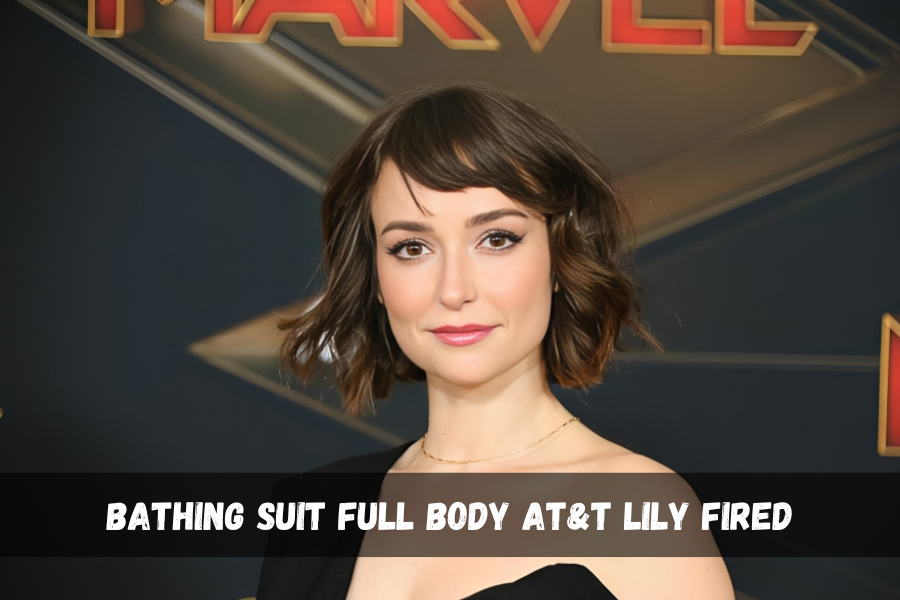Introduction: Who is AT&T’s “Lily”?
Lily, the familiar face of AT&T’s commercials (Bathing Suit Full Body AT&T Lily Fired), is a character portrayed by actress and comedian Milana Vayntrub. Since her debut in AT&T ads around 2013, Lily has become more than just an advertising figure; she’s practically an icon. Her friendly personality, relatable demeanor, and approachable charm have made her a memorable character in the world of television ads. Through her portrayal, Vayntrub gave AT&T a warm, human touch, making their services seem accessible and even comforting.
In commercials, Lily isn’t just a salesperson; she’s depicted as a tech-savvy, approachable figure who feels genuinely interested in helping customers. This combination of competence and friendliness made Lily resonate with viewers, turning a commercial character into a near-household name. But with fame comes an inevitable downside, as Milana Vayntrub would come to learn through the power—and pitfalls—of social media.
How Lily Became the Center of Attention
As Lily’s popularity grew, so did the interest from fans. While many appreciated her talent and humor, some viewers began focusing on her physical appearance in a way that crossed boundaries. Social media platforms, where fan communities share their favorite characters and TV personalities, became filled with comments and discussions about Lily’s looks rather than her role in the commercials.
Unfortunately, this led to an uncomfortable focus on Vayntrub’s body. Some viewers began commenting on her appearance in ways that were not just flattering but objectifying, focusing on her looks rather than her acting. This shift in attention was not only invasive but also increasingly inappropriate, with remarks that sexualized her character.
Social Media’s Role in the Escalating Controversy
Social media has been a double-edged sword for many actors and public figures. On one hand, it provides a platform for fans to engage and show support; on the other, it opens a door for invasive commentary and harassment. Platforms like Twitter, Instagram, and Reddit became hubs for discussions about Milana Vayntrub as “Lily.” While some fans simply appreciated her acting, others veered into disrespectful comments, with Reddit forums and Twitter threads filled with remarks fixated on her appearance.
This objectification led to a growing conversation around Milana’s portrayal of Lily, and discussions quickly shifted from positive to problematic. Some viewers began dissecting commercials frame-by-frame, further fueling conversations that crossed the line of normal fan interest. The online discourse was so intense that even AT&T noticed, with threads on Reddit and tweets that caught the attention of a much wider audience.
You May Also Like To Read: Do Alec and Kaleb Get Paid for Commercials? Understanding the Commercial World
Milana Vayntrub’s Personal Response to Online Harassment
Milana Vayntrub didn’t stay silent amid the onslaught of objectifying comments. She took to social media herself to address what she was experiencing, and her responses quickly gained widespread attention. In an Instagram Live session, she opened up about how uncomfortable the commentary had made her feel, describing it as dehumanizing and upsetting. Her honest and vulnerable response resonated with many who hadn’t realized the impact of such objectification on actors and public figures.
Vayntrub expressed how the constant barrage of comments made her feel violated, as if her talent and work were being overshadowed by unwelcome scrutiny of her appearance. She reminded her followers and viewers that she is more than a character, and that the objectification she faced was both unwanted and unnecessary. This candid approach opened up an important conversation about the treatment of women in the media, bringing attention to how seemingly harmless comments can have significant emotional impacts on the person being targeted.
The “Full Body Bathing Suit” Phrase: How It Became a Viral Term
In response to the relentless objectification, Vayntrub and AT&T decided to take a unique approach to help manage the situation. To address the inappropriate comments, AT&T minimized full-body shots of Lily in their ads. The term “full body bathing suit” began circulating as a way for fans to understand the extent to which Vayntrub’s portrayal had been limited to prevent unwanted commentary on her appearance. It became shorthand for the decision to film her character from the waist up in ads.
The “full body bathing suit” phrase soon became an internet phenomenon, with various interpretations and misunderstandings spreading across social media. Some users saw it as a statement on how far advertisers had to go to protect actors from harassment, while others speculated wildly, assuming it meant Vayntrub had been fired. In reality, the term merely referenced the decision to avoid full-body shots, illustrating the need to protect actors from the objectifying gaze that had emerged.
You May Also Like To Read: Argyle Middle School Principal Died Legacy Lives On After His Tragic Passing
Was Lily Fired? Debunking the Misconceptions
As the “full body bathing suit” phrase continued to circulate, it led to widespread rumors and misunderstandings. Many began to wonder if Vayntrub had been let go from her role due to the controversy surrounding her portrayal as Lily. Some online sources even reported unfounded speculation that AT&T had fired her due to the negative attention and online harassment. However, these rumors were simply not true.
AT&T continued to work with Milana Vayntrub and was supportive of her through the ordeal. The choice to limit certain camera angles was made with her comfort in mind, and the company valued her contributions and respected her boundaries. Despite the misconceptions, Vayntrub remained the face of AT&T commercials, and her ongoing role clarified that the rumors of her firing were merely a product of misinformation.
AT&T’s Supportive Response and Adaptation to the Situation
Throughout the controversy, AT&T demonstrated a respectful approach to handling Vayntrub’s situation. Unlike some brands that might have distanced themselves, AT&T stood by the actress, ensuring her comfort was prioritized. The company’s decision to minimize full-body shots was a supportive gesture, acknowledging the impact of the objectification and stepping in to reduce its effects on Vayntrub.
AT&T’s handling of this situation serves as an example of how companies can respect the boundaries and well-being of their representatives. They adapted their approach by working with Vayntrub to create a comfortable and safe working environment, showing that they valued her beyond her commercial portrayal.
How the Controversy Affected Milana Vayntrub’s Career
For Vayntrub, the experience of being “Lily” in the AT&T commercials had benefits and challenges. While it gave her significant exposure and established her as a recognizable figure, it also placed her under an uncomfortable spotlight. The objectification and inappropriate focus on her appearance were distressing, yet she used this experience to address issues faced by many women in the entertainment industry.
Beyond her role as Lily, Vayntrub has an extensive background in acting and comedy. She has appeared in TV shows like This Is Us and has also done voice acting work, including her role as Squirrel Girl in Marvel Rising. Her career is multifaceted, and her talent extends far beyond her portrayal of Lily. Despite the challenging experience, Vayntrub’s openness about her struggles has strengthened her platform, allowing her to advocate for more respectful treatment of women in media.
Broader Reflections on Online Culture and Objectification
The “full body bathing suit” controversy with AT&T’s Lily is not an isolated incident; rather, it underscores a recurring issue in society. Women in media, from actors and models to influencers, frequently face objectification that overshadows their skills and contributions. Social media’s rapid growth has magnified this problem, providing a platform for people to voice opinions freely, often without considering the effects their words may have.
Vayntrub’s story is a powerful reminder of the real people behind media portrayals. Her experience serves as a call to action, emphasizing the need for audiences to engage with public figures respectfully. The incident has sparked a conversation about how online culture can sometimes dehumanize individuals, reducing them to mere appearances rather than recognizing their work.
AT&T and the Entertainment Industry’s Responsibility
Brands, advertisers, and the entertainment industry as a whole have a responsibility to protect the individuals who represent them. AT&T’s response was a step in the right direction, and other companies can learn from their example. By prioritizing Vayntrub’s comfort and modifying how they presented her character, AT&T showed an understanding of the problem and addressed it constructively.
Many entertainment and advertising firms are now more aware of the need to protect their talent from objectification and harassment. Steps such as reducing certain types of camera shots, controlling comments on social media posts, and issuing public statements in support of their representatives are all ways companies can contribute to creating a safer, more respectful environment.
Media Literacy and the Audience’s Role
The “Lily” controversy also brings attention to the importance of media literacy for the audience. Being conscious of how we interpret media, advertisements, and public figures is key to reducing harmful effects. Audiences hold significant power in shaping the discourse around public figures, and understanding the impact of their words is crucial. By recognizing public figures as whole individuals rather than symbols or objects, we can create a healthier media landscape.
You May Also Like To Read: Caesar Lorenzo Newton’s Background and Family Life
Conclusion
The controversy surrounding AT&T’s “Lily,” portrayed by Milana Vayntrub, highlights a broader societal issue with the objectification of women in media. Through her portrayal of Lily, Vayntrub became a beloved advertising figure, yet she also faced invasive scrutiny due to her appearance. AT&T’s supportive response, including adjusting how Lily was filmed to protect Vayntrub’s comfort, sets a strong example for brands in respecting their representatives. This incident underscores the need for a respectful approach in media culture, reminding audiences to appreciate individuals for their talent and contributions rather than reducing them to physical appearances.
FAQs
1. Why did AT&T stop showing full-body shots of Lily in their commercials?
AT&T limited full-body shots of Lily to protect Milana Vayntrub from objectifying commentary on her appearance. This decision was made to respect her comfort and well-being.
2. Was Milana Vayntrub fired from her role as Lily in AT&T commercials?
No, Milana Vayntrub was not fired. Despite rumors, she continues to represent AT&T, with the company standing by her and making adjustments to support her comfort in the role.
3. What does the term “full body bathing suit” mean in this context?
“Full body bathing suit” became shorthand among fans to describe AT&T’s choice to focus on waist-up shots of Lily, minimizing opportunities for inappropriate comments about her appearance.
4. How did Milana Vayntrub respond to online harassment?
Milana Vayntrub openly addressed the harassment in an Instagram Live, describing the impact of objectifying comments and encouraging a respectful view of women in media.
5. How has this controversy influenced the media’s approach to representing women?
This situation with Vayntrub and AT&T has prompted discussions on objectification, leading some brands to adopt measures to protect their talent from harassment and ensure a respectful portrayal in media.
Stay informed with the news and updates on LET MAGAZINE Best Regards!



